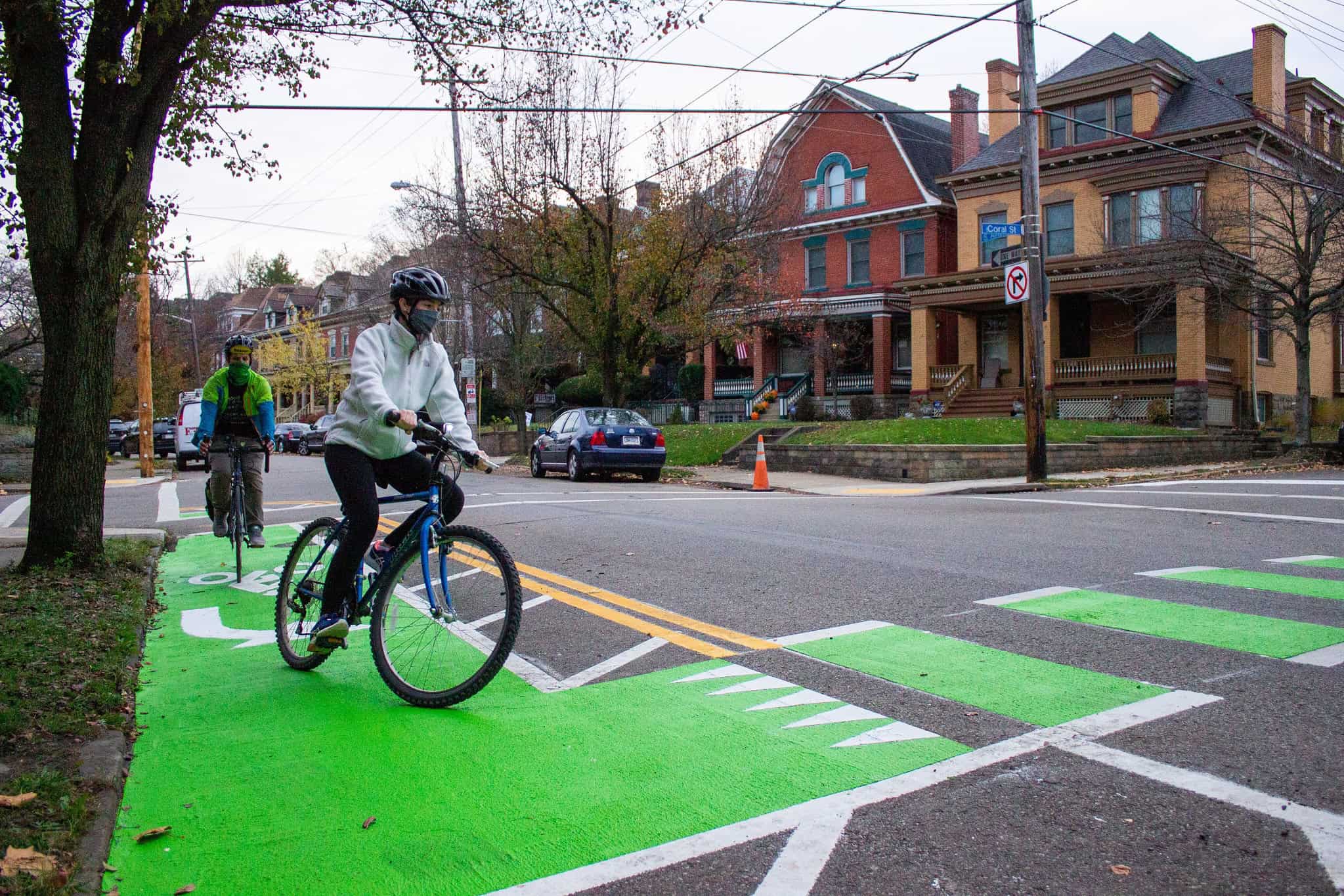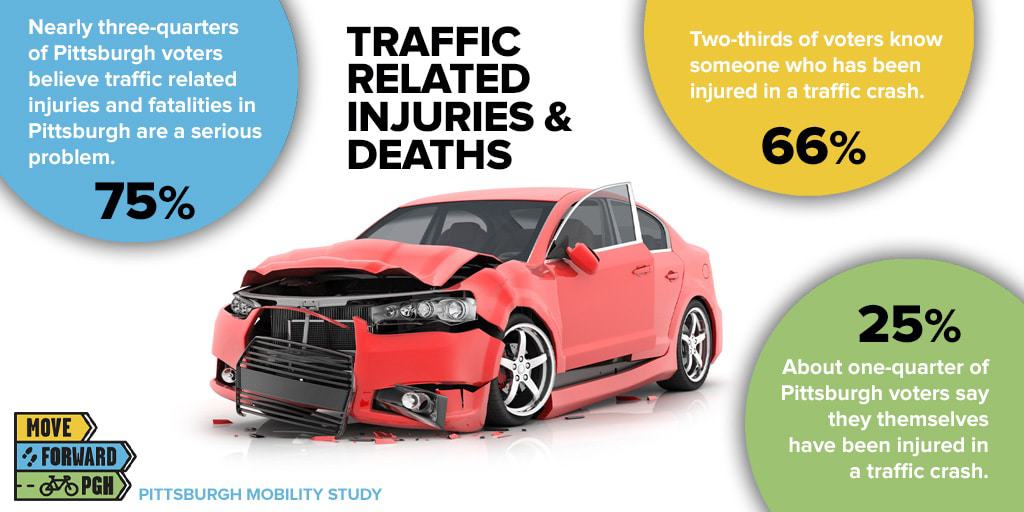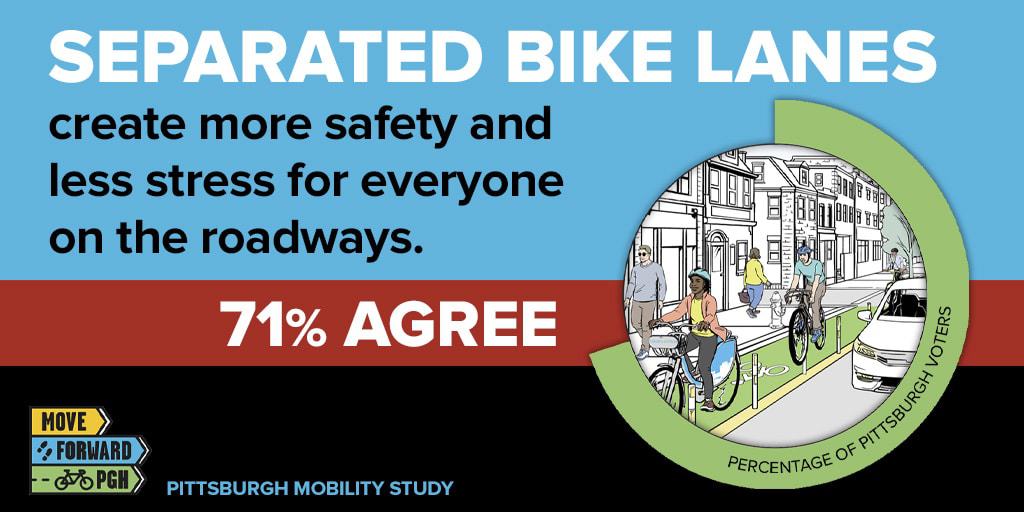
Voters overwhelmingly support the city’s efforts to expand bike+ped network, are ready for more transportation options and safer roads
PITTSBURGH – According to a new poll, Pittsburgh voters overwhelmingly believe that more transportation options and safer, complete streets will bring a better quality of life and more safety to city residents. More than 7-in-10 voters also support creating dedicated space for biking and walking routes, reducing speed limits, and creating outdoor dining and shopping opportunities on the street. Nearly three-quarters of voters believe traffic related injuries and fatalities in Pittsburgh are a serious problem. About one-quarter of Pittsburgh voters say they themselves have been injured in a traffic crash, and two-thirds know someone who has been injured in a traffic crash.

“Voters widely believe that every Pittsburgher deserves a safe way to get around the city, regardless of their means of transportation. Even when voters are unfamiliar with the Bike(+) Master Plan, once they learn more, two-thirds of voters support the plan. It’s clear there is an appetite among voters for providing safe alternatives to driving, including public transportation, biking, and walking—especially as a way to help essential workers get to work and keep Pittsburgh’s economy strong.”
– Daniel Gotoff of Lake Research Partners, who conducted the survey
The poll also shows that Pittsburgh voters strongly support the city’s efforts to give more street space to people in response to the COVID-19 pandemic and are enthusiastic about making transportation systems safer and more accessible through a rapid expansion of Pittsburgh’s bicycle network.
“Pittsburghers share a concern for safety and believe that creating safe transportation options, including bicycling and public transit improvements, is good for the city’s businesses and workers,” said BikePGH Executive Director Scott Bricker.
These poll results show what advocates have asserted all along: all residents deserve streets that are safe and accessible. Safe streets don’t leave bike riders, motorists or pedestrians to navigate incomplete connections that force everyone into unsafe or confusing situations. Said Kimberly Lucas, Assistant Director of the Department of Mobility and Infrastructure, “Pittsburgh’s streets feel dangerous to many people using them, whether they’re driving, biking, or walking. It feels difficult to get around safely, so it’s more important than ever to support traffic calming measures, so everyone can get around Pittsburgh safer and easier.”

Other findings from the poll include:
- 75% of voters agree that “Better transportation options like public buses and safe biking make Pittsburgh a desirable city to live and work.”
- 80% of voters agree that “We must provide safe alternatives to driving, like public transportation, biking, and walking to help essential workers get to work and keep our economy strong.”
- 71% of respondents agree that “Separated bike lanes create more safety and less stress for everyone on the roadways.”
- 70% of respondents agree that “Separated bike lanes for people riding bikes make the rules of the road clear and safe for everyone, including drivers.”
- 72% of respondents agree that “Better transportation options, like public buses and safe biking, make it easier to get to work on time.”
- 72% also agree that the pandemic has reinforced how important it is to have safe spaces to walk, bike, and travel in the city.
- 73% of voters agree that “Every Pittsburgh resident deserves streets that are safe and accessible no matter how they choose to get around. Safe streets don’t leave bike riders, motorists, or pedestrians to navigate incomplete connections and force everyone into unsafe or confusing situations.”
Lake Research Partners designed and administered this survey using professional interviewers in a telephone (cell and landline) survey of 600 likely voters in the City of Pittsburgh, including a base sample of 300 likely 2021 municipal voters and oversamples of 100 likely African American voters and 200 likely 2021 Democratic Primary voters. The survey was conducted March 8 – March 15, 2021. The margin of error for the base sample is +/-4.0% and larger for subgroups (e.g., +/-4.8% for the oversample of Democratic Primary voters).
